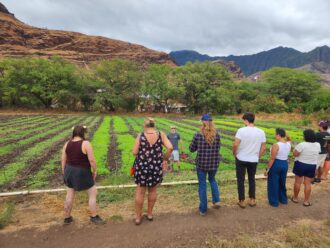Collaboration, education, and community empowerment hold potential for driving positive change. Accordingly, Regional Food Business Centers in Hawaiian, Pacific Island, and Alaskan communities are harnessing their skills and resources to reach their shared vision of resilient, sustainable, and self-reliant local food systems.
Geographic isolation, food transit logistics, large Indigenous populations, underdeveloped infrastructure, extreme climate change impacts, colonial histories, and legal issues have made creating such a food system challenging in these communities.
The Hawaii Good Food Alliance (HGFA) and its partners - the Hawaii Department of Agriculture, University of Hawaii College of Tropical Agriculture and Human Resources Extension, Guahan Sustainable Culture, Alaska Food Policy Council, and the Hawaii Agriculture Technical Assistance Hui - collectively designed a project to address the pressing need for sustainable agriculture in the USDA Regional Food Business Center (RFBC) Island and Remote Regions (Hawaii, Alaska, Guam, American Samoa, and CNMI).
Lucas McKinnon, Managing Director at HGFA, says “I’m excited to find out what key areas agricultural producers need support with and how we can share resources across the wider Pacific region to develop innovative programs to support sustainable agriculture. Finding common solutions to shared challenges and the equitable distribution of resources furthers us all toward our goal of true regenerative agriculture.”
The project will provide technical assistance and financial support to equip agricultural professionals, producers, and communities with the knowledge and resources needed to reduce risks associated with changing production practices. These risks may include high up-front costs to implement sustainable agricultural practices and opportunity costs of transitioning to sustainable agriculture, among others.
Robbi Mixon, Executive Director, Alaska Food Policy Council, states, “This project comes at an opportune moment for Alaskans. Since 2017, there has been an 18% increase in Alaskan farms, with almost half of our 1,173 farms operating on 9 acres or less. Additionally, the state continues to have one of the youngest farming populations in the country. This project will help support these small-scale producers by sharing knowledge and solutions.”
Through educational activities, workshops, training, and digital campaigns, the project will empower agricultural leaders to both adopt and share sustainable agriculture practices.
The goal is to have producers and agricultural professionals gain a deeper understanding of principles such as soil health, integrated pest management, and ecological farming methods. Participants will also have opportunities to strengthen their technical proficiency in fields such as precision agriculture and agroforestry.
As important as practices and technical proficiency are, additional values lie in empowering decision-making, encouraging collaboration, and networking, and identifying and nurturing emerging leaders in the different communities. The tailored training and education focusing on increased decision-making skills, collaboration, and community-specific leadership will lead to an increased ability to address these communities’ unique challenges.
Lucas calls this project “ambitious” and a “shot for the stars” as it was quickly pulled together by partners in the currently funded RFBC project.
“We saw an opportunity to leverage additional funds and expand specifically towards sustainable agriculture practices. The production of good food grown sustainably is key for local public health.”
According to Lucas, this project aligns with HGFA’s overarching goal to create more equitable and sustainable food systems aligns with HGFA’s “One Health” approach, as they create programs to derive health outcomes through projects that build on the interconnectedness between people, animals, plants, and the shared environment. Some of these efforts include the USDA Regional Food Business Center work, the Food Hub Hui network, and new Food is Medicine initiatives.
For the past few years, the partners have been working together in an atmosphere of relationship building and conversations toward finding common solutions and decreasing redundancies.
“Guam is excited to be a part of this collaborative effort to promote sustainable agriculture practices across the Pacific region. This project will not only help strengthen our local food systems but also empower our farmers and agricultural professionals to become leaders in the movement towards a more sustainable future. Through education, training, and community engagement, we aim to create a lasting impact that will benefit generations to come.” Michelle Crisostomo, President & Co-founder, Guahon Sustainable Culture.
